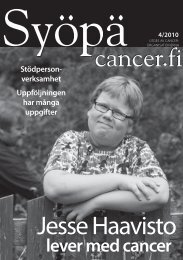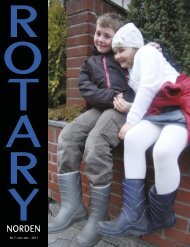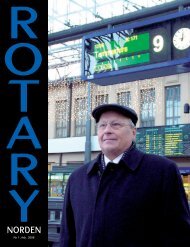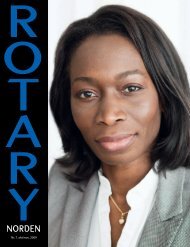Create successful ePaper yourself
Turn your PDF publications into a flip-book with our unique Google optimized e-Paper software.
Rattanavich has been a passionate<br />
advocate of CLE since 1982.<br />
world seem to approach language<br />
learning in the same way, emphasizing<br />
rote memorization and<br />
theory. “They think they have to<br />
teach grammar before they teach<br />
people how to communicate. It<br />
takes a long time to change this<br />
way of thinking,” she says.<br />
In 1982, shortly after she returned<br />
to Thailand, Rattanavich<br />
met Richard Walker, an encounter<br />
that changed her life: It was through<br />
him that she learned about the CLE<br />
method. Walker, who pioneered<br />
this technique, had been invited to<br />
develop literacy courses for Thai<br />
universities. In Walker, Rattanavich<br />
had found a new ally, someone who<br />
Global Digest<br />
Literacy projects Make Dreams Real<br />
For years, literacy has been on<br />
the forefront of Rotary service,<br />
with ongoing projects in thousands<br />
of communities worldwide.<br />
These literacy projects all demonstrate<br />
a commitment to working<br />
closely with local communities after<br />
assessing their needs.<br />
www.rotary.org/go<br />
shared her belief that teaching had<br />
to be a dynamic activity rather than<br />
a passive one.<br />
Rattanavich explains: “The most<br />
effective way to learn is by doing. The<br />
CLE techniques produce concrete results<br />
in two or three hours. Recently,<br />
I was in India. They dared me to<br />
prove how effective CLE is. I took up<br />
the challenge, and in three hours I<br />
taught a group of Indian children to<br />
speak rudimentary Thai. They didn’t<br />
have a big vocabulary, just enough to<br />
communicate their needs.”<br />
Walker brought more into Rattanavich’s<br />
life than the CLE method;<br />
he also introduced her to Rotary.<br />
“When I went to Australia to learn<br />
more about CLE, I stayed in Richard<br />
Walker’s home,” she says. “He went<br />
to regular Wednesday night Rotary<br />
meetings. He talked about Rotary all<br />
the time and explained the concept<br />
of Service Above Self. I was very impressed<br />
by this idea and continue<br />
to be committed to its principles. At<br />
the time, I couldn’t join Rotary because<br />
I was a woman, but I’m proud<br />
to say that in 1990 I became the first<br />
female Rotarian in my club.”<br />
Rattanavich continues to promote<br />
and conduct training sessions<br />
Literacy part of bigger<br />
package in Egyptian project<br />
Members of the Rotary Club of<br />
New Cairo, Egypt, are working to<br />
improve the lives of women and<br />
children in their city through an<br />
educational project focused on<br />
literacy, reproductive health, and<br />
vocational training.<br />
The program is the result of a<br />
on CLE, which she feels is limitless<br />
in its application because it can<br />
work for anyone. Recently, Rotarians<br />
in Cairo invited her to train some<br />
local blind students. “They brought<br />
together the group and some of the<br />
teachers,” she recalls. “I spent about<br />
five hours with them, and we had<br />
wonderful results. Of course, you<br />
have to adapt your teaching techniques.<br />
We used Braille texts, but<br />
we also had them learn by touching<br />
objects. The trick is to find the most<br />
stimulating way for them to learn<br />
the new language.”<br />
Rattanavich’s newest project is<br />
perhaps her most ambitious and<br />
easily her most profound: using<br />
CLE techniques to help reduce child<br />
mortality. “Many babies die because<br />
of their mothers’ ignorance,” she<br />
says. “I am working with some doctors<br />
in my Rotary club to design a<br />
simple book on child care that illiterate<br />
mothers could understand.”<br />
Her passion for this work, she<br />
says, has shown her that “literacy<br />
is an ongoing, lifelong struggle. We<br />
live in a world full of conflict. But<br />
if people could understand each<br />
other, they would get along.”<br />
Lawrence Jeffery<br />
partnership between the Rotary<br />
clubs of New Cairo and Geldern,<br />
Germany, and has received additional<br />
support from a Rotary Foundation<br />
Matching Grant.<br />
The literacy classes use the concentrated<br />
language encounter (CLE)<br />
method, and a national Rotarian<br />
committee trains teachers in the<br />
technique. Nearly 5,000 students










